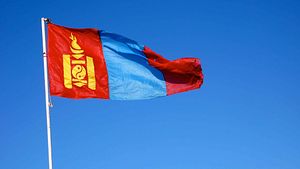Reflecting on the changing security environment encircling Mongolia today, Ulaanbaatar is currently revising its 2010 National Security Concept and has increased its defense budget, amid growing defense spending across the region.
In 2022, the Japanese Ministry of Defense unveiled another record-high defense budget, allocating 6.82 trillion yen ($51.4 billion) for its Japanese Self-Defense Forces. South Korea passed a five-year defense budget, indicating an increase of 6.8 percent annually. These are high figures based for the individual states, based their specific security concerns.
However, these figures cannot compare to China and the United States.
The International Institute for Strategic Studies (IISS) put things in perspective: “China’s 2020 [defense budget] increase, amounting to a nominal US$12 billion, was still greater than the combined defense budget increases in all other Asian states. Indeed, increases in the US and Chinese defense budgets accounted for almost two-thirds of the total increase in global defense spending in 2020.”
In 2022, China announced 1.45 trillion yuan ($229 billion) in defense spending, a 7.1 percent of increase from 2021.
Whether it’s driven by competition between the United States and China or unresolved historical issues, it is apparent that regional actors are on edge. The escalation of the Russia-Ukraine war is only the latest addition to an already historically contentious region, which has many unresolved security issues. The unfortunate inherent risk and equivocal actions of the East Asian actors are in direct correlation to the increases in the regional states’ defense budgets.
Returning to Mongolia, the country’s immediate security concerns involve the stability of its two neighbors – Russia and China, both comprehensive strategic partners. Ulaanbaatar’s economic interests and ties are directly influenced by events in Moscow and Beijing.
As Russia’s war with Ukraine drags on toward its one-year anniversary, Mongolia is feeling the effects. Mongolia continues to receive Russian citizens from all walks of life fleeing their home country. But Ulaanbaatar cannot sustain a constant flow of refugees, nor does it have the economic capacity.
These are tumultuous times for small states like Mongolia to balance, navigate, and protect their national interests. Much depends on how Mongolian policymakers react to the multitude of external threats.
It is clear that Ulaanbaatar does not have control over most of the region’s security issues; however, Mongolia’s multi-pillared foreign policy will let it avoid the thorny bilateral issues between regional actors. Mongolia’s foreign policy will continue to support diplomatic dialogues, peaceful solutions, and most importantly, maintain its nuclear weapons-free status.
However, Mongolia too is moving to increase defense spending. According to the Ministry of Defense’s figures, in 2020 and in 2021, Mongolia approved a defense budget of 283 billion Mongolian tugrik. In 2022, the defense budget increased to 296 billion tugrik. In December 2022, the government of Mongolia approved 312 billion tugrik (roughly $91.5 million) for the Ministry of Defense’s 2023 budget, an increase of 5.4 percent from the previous year.
Beyond the external security issues, Mongolia’s internal security environment has been changing for some time now, according to Dr. Enkhbold Rentsen, a former researcher at the National Security and Defense Magazine of Mongolia.
According to Rentsen, “The normal functioning of the constitutional institution, the judiciary, legitimate elections, and prolonged unsolved socioeconomic issues are now being questioned by the people. As Mongolia’s surrounding external security environment changes, the country’s legal documents and framework must change too.”
In June 2022, the Office of the National Security Council of Mongolia drafted an amendment to the 2010 National Security Concept, which was presented to President Khurelsukh Ukhnaa. These amendments will need to be reviewed and approved by the Mongolian parliament before fully being adopted.
When the Mongolian government revised its 1994 National Security Concept, Mongolia was in the midst of a transition to a multi-party democratic system. The current revision is one of the most important legal frameworks that will steer how Mongolia will navigate today’s rapidly changing waters. Most importantly, Mongolia must protect its national interest and safeguard its independence and sovereignty.

































